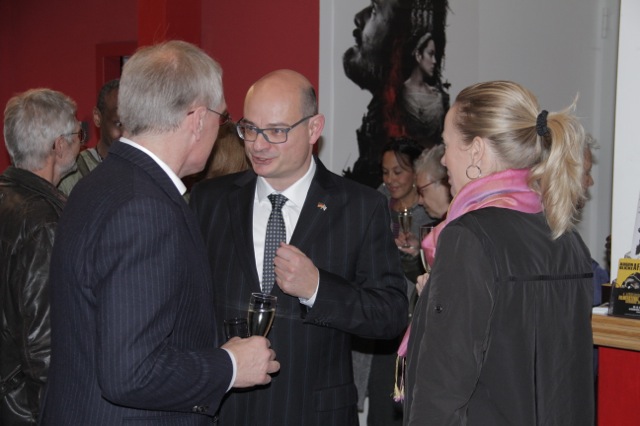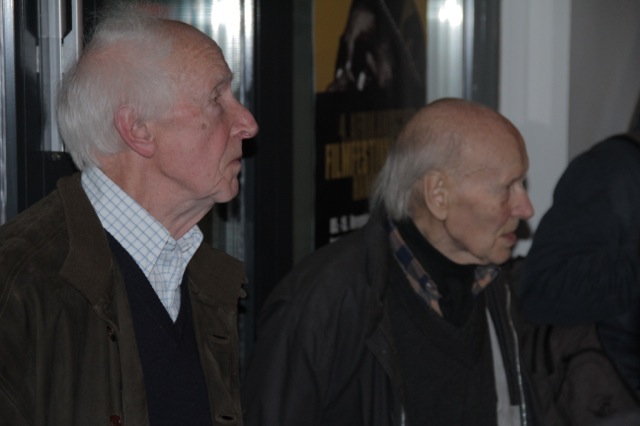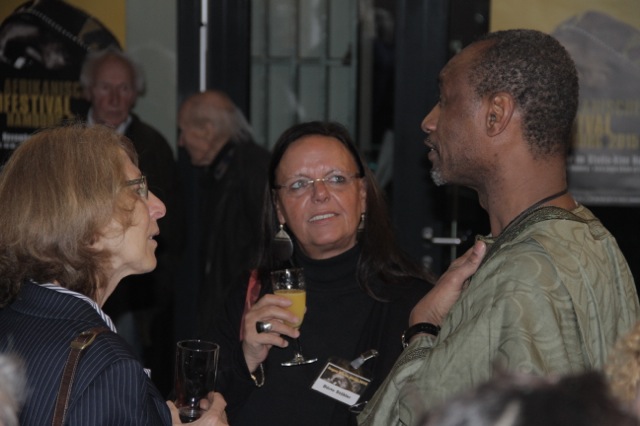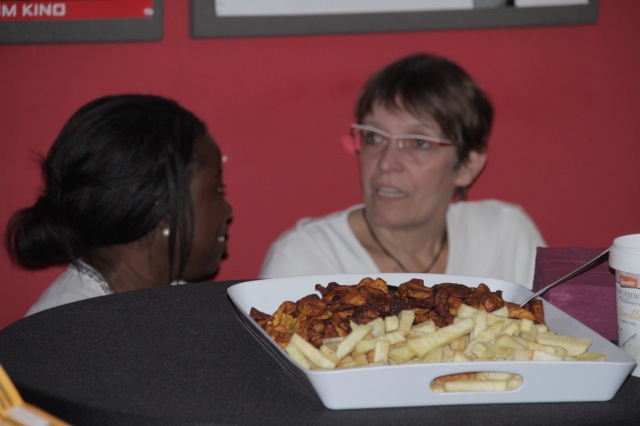AUGEN BLICKE AFRIKA 2015 – Some Afterthoughts
Our fourth African film festival AUGEN BLICKE AFRIKA 2015 drew to a close about three weeks ago with a final screening of four films. As the organizers of this festival we are very proud and pleased with the outcome. Despite some mishaps and uncertainties everything eventually worked out: all films could be shown, all invited guests arrived in time, and almost all showings found some lively reception.
The absolute frontrunners, which sold out the theater, were the wonderful movie „Soleils“ by our patron this year Dani Kouyaté from Burkina Faso, the refugee drama „Hope“ by Boris Lojkine, as well as „Finding Fela“ by Alex Gibney, a fascinating portrait of the founder of Afrobeat from Nigeria.
 Hope |
 Finding Fela |
„Soleils“ impressed with its calm narrative style. Dani Kouyaté, himself a member of a griot family, is continuing the traditional form of narration, as he said, through the contemporary medium of film. Rarely has anyone dug so deeply into the tradition and philosophy of an African people in an African film. The revelation of the declaration of human rights in the large West African Mandingo empire 500 years prior to the declaration of human rights in Europe was particularly impressive. Thereby the film emphasizes that Africa is not a dark continent devoid of history, as even great European thinkers have claimed.
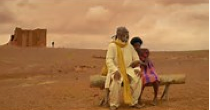 Soleils |
 Dani Kouyaté |
The responses to the film „Miners shot down“ were particularly positive. It presented political as well as individual facets of the shootings of peacefully demonstrating miners in South Africa. The following discussion with the British lawyer James Nichol showed once more how this strike that was put down violently through the ruling ANC party under President Jacob Zuma has permanently changed the political landscape of South Africa.
 In general, this year the documentaries left the deepest impact. They are authentic films that acutely describe the conditions of life in African regions. Among them are „Beats of the Antonov“ by Hajooj Kuka from Sudan, „Hamou beya – Sandfishers“ by Andrey Samouté Diarra from Mali, and „Ady Gasy – The Malagasy way“ by Nantenaina Lova from Madagascar.
In general, this year the documentaries left the deepest impact. They are authentic films that acutely describe the conditions of life in African regions. Among them are „Beats of the Antonov“ by Hajooj Kuka from Sudan, „Hamou beya – Sandfishers“ by Andrey Samouté Diarra from Mali, and „Ady Gasy – The Malagasy way“ by Nantenaina Lova from Madagascar.
 Nantenaina Lova |
 Hajooj Kuka |
 Andrey S. Diarra |
We had invited two filmmakers: Filipe Henriques from Guinea-Bissau with his film „O Espinho da Rosa“ and Cheik Fantamady Camara from Guinea with „Morbayassa – Le serment de Koumba“. The discussion after Henriques’ unusual and upsetting film provided the audience with some insight and guidance about the idea of the film and its realization. The story of the film originates in his grandfather’s telling of stories at night. Henriques combined this story with accounts of incest. These elements were transported into a modern form, a mix between a love story, science fiction and a crime thriller. „Morbayassa“ is a typical story of many African women who break free from coercive conditions and are searching for their own identity.
 Filipe Henriques |
 Hans-Jörg Heinrich und Cheick F. Camara |
From the two programs of short movies the feature film „Twaaga“ by Cedric Ido from Burkina Faso stood out. This film ties together the fantasy world of the boy Manu, in which he is a superhero, with the tragic reality of the Burkinabe „superhero“ Thomas Sankara; both were killed at the end.
More highlights of the festival were our two central themes.
In particular the documentary „Boy Saloum“ by director Audrey Gallet and the subsequent remarks on the protest movement “Y’en a marre” by our guest, the Senegalese rapper and political activist Thiat prompted repeated hurricanes of applause from the audience. Because of those long lasting protests a third and unconstitutional term of the then sitting Senegalese president Abdoulaye Wade could be prevented.
 Thiat |
 Diskussion im Kino |
The second film „Revolution mit bloßen Händen“ showed how a year ago the citizens’ movement “Bürgerbesen” literally swept President Blaise Compaoré, who also attempted a third unconstitutional term, out of office in Burkina Faso.
For our second thematic focus “Queer Africa” on the situation of lesbians, gays, and transgender people in Africa we had invited Imam Muhsin Hendricks and youth adviser Wisaal Abrahams of the South African organization “The Inner Circle” as well as Uta Schwenke of the “LSVD” and the “Hirschfeld Eddy Foundation” to join in discussion. This exchange turned into a very personal interview with both South African guests about their lives, their „coming out,“ and the reactions of their Muslim community, friends, and acquaintances. They gave a lively report on their organization “The Inner Circle” and the expansion of its activities to other African countries and as far as Asia and Europe. Uta Schwenke introduced the dedicated work of the “LSVD” in Germany and Africa.
 We were pleased to collaborate with Uta Reuster-Jahn who introduced films from Tanzania at Hamburg University’s “Asian African Institut” that focused on problems of translating Swahili into German.
We were pleased to collaborate with Uta Reuster-Jahn who introduced films from Tanzania at Hamburg University’s “Asian African Institut” that focused on problems of translating Swahili into German.
We were also able to welcome two tenth-grade classes to a screening of „Making of – Kamikaze“ by Tunisian producer Nouri Bouzid. The film illustrates how young people in dire personal situations can be drawn into the circles of fundamentalist recruiters and be politically abused. On that topic we had an exciting discussion with Mahmut Erdem who, as a lawyer, counsels families whose children join ISIS and a student of Islamic studies, Iftikar Malik who is also in contact with such families.
On the last Saturday of the festival we danced and celebrated the completion of a successful fourth African film fest with a potpourri of musical classics.
 Now we are starting to search for new exciting film productions from the diverse African continent for November 2016.
Now we are starting to search for new exciting film productions from the diverse African continent for November 2016.
 Bis dahin bleibt dran, lasst die Filme nachwirken und macht neue Begegnungen mit Afrika.
Bis dahin bleibt dran, lasst die Filme nachwirken und macht neue Begegnungen mit Afrika.







